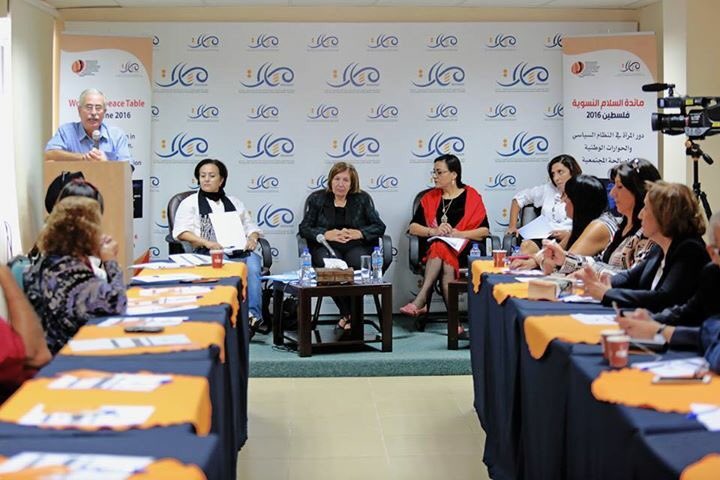Palestinian women put serious peace on the table

The Global Campaign on Women, Peace and Security dubbed “#WomenSeriously” was launched June 12, 2014 at the Global Summit to End Sexual Violence in Conflict held at ExCel London.
Palestinian women cross divide to meet at ‘peace tables’
Women gathered at “peace tables” in Ramallah and the Gaza Strip to discuss Palestinian women’s roles in promoting peaceful solutions as part of a worldwide October movement that included Islamic women’s groups.
By Aziza Nofal, trans Pascale el-Khoury, Al Monitor/ Palestine Pulse
November 21, 2016
RAMALLAH, West Bank — The Palestinian Centre for Policy Research and Strategic Studies (Masarat) held its second women’s peace table on Oct. 26. A videoconference brought together two meetings: one at the centre’s headquarters in Ramallah, and one at its other headquarters in Gaza. The event was held in conjunction with dozens of other women’s peace tables across the world.
This year, the event focused on refining the role of women in bringing peace to Palestine and Palestinian society. The meetings brought together women leaders and pioneers in the West Bank and Gaza, such as Siham al-Barghouthi, a former minister and undersecretary-general of the Palestinian Democratic Union, and Rula Abu Duhou, a lecturer on women’s issues at Birzeit University.
The first such peace table, held in 2015, was called “Conflict, Peace, International Dimension: A Palestinian Feminist Point of View.” This year’s peace table is themed “A Call for the Consolidation of the Role of the Women’s Movement in Defending Women and their Political and Societal Rights.”

The #womenseriously peace table held in Gaza on October 29th Another was held in Al-Bireh, West Bank.
Fayha Abdul Hadi, a regional coordinator of Women for Peace, worked with Women Seriously to organize the peace tables around the world. She told Al-Monitor, “We tried through this table to take a step forward in the peace process from a feminist perspective, with the objective of ending the occupation and empowering women to bring peace inside Palestine.”
She explained that the idea is to hold discussions about women’s roles in conflicts and peacemaking, in light of the underrepresentation of women in these activities across the world. She said, “We want to bring about change that will create a shift at the political level and translate into actions at the national, regional and global levels.”
Though the main objective of these events is engaging women and discussing how to promote women’s participation in peacemaking, the regional organizers choose the most pressing topics to be discussed. The Palestinian women’s peace table focused this year on women’s participation in societal peace and in ending the occupation.

Women’s peace table, Gaza, October 29th.
Abdul Hadi said, “We have tried through these tables to form Arab networks and establish relations with global networks with which we share common concerns. We want women to understand our side of the story and not the widespread Zionist story.”
Wafa Abdel Rahman, director of the Filastiniyat organization and one of the three participants who presented papers during the event, told Al-Monitor, “These tables aim to define peace from a Palestinian viewpoint. The concept of peace in the current Palestinian reality carries negative connotations, such as normalization with the occupation. Therefore, external peace with the occupier must be redefined as putting an end to the occupation and bringing about justice and equality. As for internal peace, it must be redefined through efficient participation by women in political life.”
She added, “We already identified these concepts in our first dialogue table. This is why we should go further this time by focusing on women’s participation in making peace inside Palestine and redefining the Palestinian national project.”

Peace table, Al Bireh, West Bank, October 24, 2016, #womenseriously
Abdel Rahman’s paper, published online after the event, is titled, “Strengthening the Participation of Women in National Dialogues.” In it, she explained, “Women participate in many fields in name only. Women need to impose their own vision in various fields to be able to break through the patriarchal society and strengthen their role and position in the community, free of partisan and personal interests.”
Masarat’s programme director Khalil Shaheen told Al-Monitor, “Perhaps the most important feature of these meetings is the participation of women activists from different political and intellectual movements. This event provided them with an opportunity for dialogue.”
He continued, “[Palestinian] women’s dialogues are mostly held under the umbrella of the General Union of Palestinian Women, which does not represent all women’s groups, particularly Islamic ones, such as Hamas and the Islamic Jihad. Islamic women activists such as women’s rights activist Majida Fedda are participating for the first time in these tables. This paves the way for a comprehensive national dialogue at all levels, specifically in terms of national reconciliation.”
Researcher Hidayat Shamoun from the Gaza Strip presented her paper, “The Development of the Participation of Women in Societal Reconciliation and Transitional Justice in the Palestinian Context Following Nine Years of Internal Division.” In it, Shamoun called for the formation of a national women’s authority to take on societal reconciliation with cross-organizational support.
Shaheen agreed with the content of Shamoun’s paper, noting that women have paid the heaviest price for the Palestinian division, and this issue is not typically addressed in societal reconciliation discussions. He said, “The second Palestinian women’s peace tables are a loud call that women are not only subject to the negative repercussions of the internal division, but also a partner in finding solutions to end this division.”
Shaheen said, “These events ensure an international presence for the Palestinian women’s movement. They serve as a means to ensure that Palestinian women are not isolated from the international women’s struggle.”
Even while these and other events bring Palestinian women together to one dialogue table, structural barriers to women’s participation in peacemaking will remain after these conferences end.
